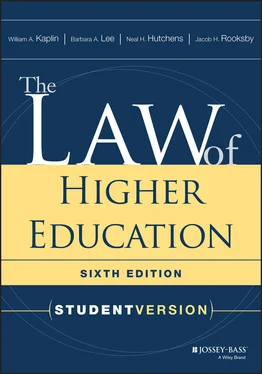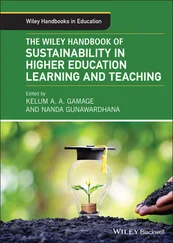The inclusion of a grievance procedure in a faculty or staff employee handbook may convince a court that a plaintiff who has not exhausted internal remedies may not pursue contractual remedies in court. For example, in Brennan v. King , 139 F.3d 258 (1st Cir. 1998), an assistant professor who was denied tenure by Northeastern University brought breach of contract and discrimination claims against the university. With respect to the professor's contract claims, the court ruled that Massachusetts law required him to exhaust his contractual remedies before bringing suit. However, the court allowed his discrimination claims to go forward because the faculty handbook did not provide a remedy for the denial of tenure.
Even if there is no formal grievance process, in situations where faculty are challenging negative employment decisions (such as discipline or termination), a panel of peers may be convened to consider whether there are sufficient grounds to support a challenged employment decision. The outcome of the peer panel's deliberations is usually considered a recommendation, which the administration may accept, modify, or reject. In addition, student judicial boards are a form of peer review of student charges of misconduct, although appeals are usually ultimately decided by a high-level administrator. Finally, ombudspersons, or neutral employees of the institution who have the responsibility to try to resolve disputes informally and confidentially, are appearing with more frequency on campus. 4
ADR processes involving individuals external to the institution include mediation, in which a neutral third party is engaged to work with the parties to a dispute in an effort to resolve the conflict. The mediator may meet with the parties together to attempt to resolve the dispute or may meet with each party separately, hearing their concerns and helping to craft a resolution. The mediator has no authority to decide the outcome but may provide suggestions to the parties after listening to each party's concerns. All parties to the dispute must agree with the outcome in order for the process to be final.
In 2019, the Trump administration proposed new regulations enforcing Title IX's prohibition of sexual harassment in educational programs receiving federal funds (Title IX is discussed in Section 11.5.3 of this book). Although enforcement guidance from the Obama administration had discouraged the use of mediation in cases of sexual harassment and assault, the proposed regulations permit mediation if both parties agree. At the time this book went to press, final regulations had not been issued.
In addition to concerns about an alleged victim's right to pursue a more formal grievance process, mediation of harassment or assault claims may mean that no formal record is made of the harassment or assault claim or its resolution, which could pose a problem if the alleged victim subsequently filed a lawsuit against the college or university or its staff. The lack of a record could also be problematic if the alleged harasser is again accused by another complainant but the institution has no record of the earlier complaint or its resolution.
Another form of ADR, used frequently on campuses where employees are represented by unions, is arbitration. An arbitrator, a third-party neutral with experience in employment issues, is brought in to act as a “private judge.” The parties present their concerns to the arbitrator at a hearing at which the employer has the burden of proving that the termination or discipline was justified. Arbitration is also used to resolve disputes over the meaning of contract language; in that case, the party disputing the application of the contract language to a problem (usually, but not always, the union) has the burden of demonstrating that the contract has been breached. Under a trio of U.S. Supreme Court cases called the “Steelworkers Trilogy,” 5 arbitration decisions are not reviewable by courts unless the arbitrator has exceeded the authority given to him or her by the contract, the arbitrator has engaged in misconduct, or the outcome of the arbitration violates some important principle of public policy.
ADR systems in collective bargaining agreements are subject to the negotiation process and typically state that all claims arising under the contract will be subject to a grievance procedure that culminates in arbitration. Arbitration may be advisory to the parties, or they may agree to be bound by the decision of the arbitrator (in which case the arbitration is called “binding arbitration”). At some colleges and universities, nonunionized employees may be asked to sign agreements to arbitrate all employment-related disputes, rather than filing lawsuits. These “mandatory arbitration agreements” have, for the most part, survived vigorous court challenges, particularly by plaintiffs attempting to litigate employment discrimination claims. The legal standards for enforcing an arbitration agreement when employment discrimination claims are brought by unionized employees are discussed in Section 4.3.3of this book.
If the employees are not unionized, however, the standards for enforcing arbitration clauses are somewhat less strict. Beginning with a decision by the U.S. Supreme Court in Gilmer v. Interstate-Johnson Lane , 500 U.S. 20 (1991), courts have agreed to enforce arbitration clauses in individual employment contracts. Gilmer, a registered securities representative, had signed a contract that required him to submit all employment disputes to compulsory arbitration. When he challenged his discharge by filing an age discrimination claim, his employer filed a motion to compel arbitration, which the trial court upheld. The appellate court reversed, but the U.S. Supreme Court sided with the trial court, ruling that the language of the contract must be enforced.
In several cases decided after Gilmer , trial courts have enforced arbitration clauses in situations where plaintiffs have filed employment discrimination claims with an administrative agency or in court. The Supreme Court in Gilmer noted that the Federal Arbitration Act (9 U.S.C. §§ 1 et seq.) favors arbitration agreements and that they should be upheld whenever appropriate. Since Gilmer , most lower federal courts, as well as the U.S. Supreme Court, have upheld most arbitration agreements; these cases are discussed in Sections 4.3.6 and 4.5.5.
Courts typically use contract law principles to determine whether an employee's agreement to use arbitration rather than to litigate is binding. In Futrelle v. Duke University , 488 S.E.2d 635 (N.C. Ct. App. 1997), a state appellate court dismissed a medical librarian's breach of contract, wrongful discharge, and defamation claims because she had used Duke University's internal grievance procedure, which culminated in arbitration. The plaintiff had prevailed at arbitration and Duke gave her a check for the damages the university had been ordered to pay by the arbitrator. The court ruled that because the plaintiff had cashed the check, which was in satisfaction of the arbitration award, she was precluded from initiating litigation about the same issues that had been determined through arbitration.
2.3.3 Applications to colleges and universities.Litigation involving ADR in colleges and universities has focused primarily on what issues an arbitrator may decide and under what circumstances an arbitration award may be overturned by a court.
Because ADR mechanisms are created by the parties in contracts, an arbitrator's authority to resolve a particular issue and the authority to impose a sanction are creatures of the arbitration agreement. Although faculty at a number of unionized colleges and universities are covered by collective bargaining agreements that provide for arbitral review of most employment decisions, many agreements do not permit the arbitrator to grant or deny tenure, although they may allow the arbitrator to determine the procedural compliance or fairness of the tenure decision. In Board of Trustees of the California State University v. Public Employment Relations Board, 66 Cal. Rptr. 3d 389 (Cal. Ct. App., 2d Dist. 2007), the state's Public Employment Relations Board, interpreting the state's enabling legislation for collective bargaining at the state university system, had ruled that a collective bargaining agreement between the faculty union and the California State University system could not include a provision that limited the power of an arbitrator to reverse a campus president's decision on appointment, reappointment, tenure, or promotion. A state appellate court reversed the board's ruling, stating that the board had misinterpreted the statute, and allowed the limitation on the arbitrator's authority to stand.
Читать дальше












